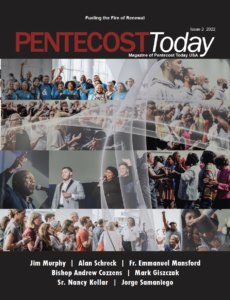32nd Sunday in Ordinary Time
Meditation and Questions for Reflection or Group Discussion
Mass Readings:
1st Reading 1 Kings 17:10-16
Responsorial: Psalm 146:7-10
2nd Reading: Hebrews 9:24-28
Gospel: Mark 12:38-44
This poor widow . . . (Mark 12:43)
Let’s take a short Bible quiz based on today’s readings.
- “The fatherless and the _________ he sustains” (Psalm 146:9).
- The woman who helped Elijah in today’s first reading is often called “the _________ of Zarepath” (Luke 4:26).
- The woman who put two small coins into the Temple treasury in today’s Gospel was a ___________ (Mark 12:42).
If you answered “widow” for all three, you’re right. From Ruth and Naomi to the old woman in today’s Gospel, widows play an important role in Scripture. Along with orphans, they are considered the most vulnerable of people. And it’s because of how humble, needy, and powerless they are that God has a special love for them. It’s also why he commands us to treat them in a special way.
The heroine in today’s Gospel had nothing to offer people. She had no money, no social status, no influence that would help anyone get ahead. She was probably too old to care for children or to do even menial housework. All anyone could do was give to her—care for her, protect her, and treat her with respect and honor.
Jesus himself seemed to have a special love for widows. He went out of his way to raise the son of a lonely widow from the dead (Luke 7:11-17). He told a story about a persistent widow to teach us how to pray (18:1-8). And he made sure his disciples saw the generosity of the widow in the Temple.
Jesus has commanded us also to have a special care for widows—along with widowers, orphans, the vulnerable, and the needy as well. Some of them are hanging on by a thread, and they need our help. What’s more, caring for God’s beloved poor also has the power to rescue us from selfishness, pride, and self-sufficiency. It teaches us to serve as Jesus does. In the end, it just may be what will save us.
“Lord, help me to love the widow and the orphan, not just with my thoughts, but with my hands as well.”
(Many thanks to The Word Among Us (www.wau.org) for allowing us to use meditations from their monthly devotional magazine. Used with permission.)
Download a .pdf of this week’s Reflection and Questions here:

Questions for Reflection or Group Discussion:
-
- In the First Reading, Elijah asks a widow to bake him some bread. Her response is very sorrowful: As the LORD, your God, lives, I have nothing baked; there is only a handful of flour in my jar and a little oil in my jug. Just now I was collecting a couple of sticks, to go in and prepare some-thing for myself and my son; when we have eaten it, we shall die. Their encounter continues with these words: Elijah said to her, “Do not be afraid. Go and do as you propose. But first make me a little cake and bring it to me. Then you can prepare something for yourself and your son. For the LORD, the God of Israel, says, ‘The jar of flour shall not go empty, nor the jug of oil run dry until the day when the Lord sends rain upon the earth.’” She left and did as Elijah had said. She was able to eat for a year, and he and her son as well; the jar of flour did not go empty, nor the jug of oil run dry, as the LORD had foretold through Elijah.
- In what way does this reading stress the importance of faith in the Lord?
- In what way does it stress the fruits of being obedient to God’s words?
- Was there ever a time when your faith in the Lord was tested, and you were obedient to something difficult that you believed the Lord wanted you to do? What was the result of that obedience?
- The Responsorial Psalm speaks of the Lord’s faithfulness to the most needy: The LORD keeps faith forever, secures justice for the oppressed, gives food to the hungry. The LORD sets captives free. The LORD gives sight to the blind. The LORD raises up those who were bowed down; the LORD loves the just. The LORD protects strangers. The fatherless and the widow he sustains, but the way of the wicked he thwarts.
- In what way do you see this as a call for us to imitate the Lord by reaching out to others less fortunate than us?
- What are some new and specific ways you can respond to this call?
- The Second Reading from Hebrews opens with these words: Christ did not enter into a sanctuary made by hands, a copy of the true one, but heaven itself, that he might now appear before God on our behalf. Not that he might offer himself repeatedly, as the high priest enters each year into the sanctuary with blood that is not his own; if that were so, he would have had to suffer repeatedly from the foundation of the world. But now once for all he has appeared at the end of the ages to take away sin by his sacrifice. The reading ends with these words: Just as it is appointed that human beings die once, and after this the judgment, so also Christ, offered once to take away the sins of many, will appear a second time, not to take away sin but to bring salvation to those who eagerly await him.
- How do the opening words of the reading contrast the differences between the sacrifice of Jesus and the sacrifice of the Jewish high priests?
- In light of the ending words that contrast Jesus’ first coming and sacrifice on the cross for our sins with his second coming, why should we be joyful and expectant as we “eagerly await” Jesus’ second coming?
- The Gospel reading begins with Jesus condemning the hypocritical actions of the scribes. It ends with these words: He sat down opposite the treasury and observed how the crowd put money into the treasury. Many rich people put in large sum. A poor widow also came and put in two small coins worth a few cents. Calling his disciples to himself, he said to them, “Amen, I say to you, this poor widow put in more than all the other contributors to the treasury. For they have all contributed from their surplus wealth, but she, from her poverty, has contributed all she had, her whole livelihood.”
- Although Jesus contrasts the behavior of the poor widow with “rich people,” in what way does he also contrast the difference between the widow and the scribes? Why do you think Jesus did this? How does it apply to your own life?
- In what way is the poor widow’s action similar to the actions of the poor widow in the first reading?
- The meditation tells us that “Jesus himself seemed to have a special love for widows.” It ends with these words: “Jesus has commanded us also to have a special care for widows—along with widowers, orphans, the vulnerable, and the needy as well. Some of them are hanging on by a thread, and they need our help. What’s more, caring for God’s beloved poor also has the power to rescue us from selfishness, pride, and self-sufficiency. It teaches us to serve as Jesus does. In the end, it just may be what will save us.”
- Why do you think Jesus had “a special love for widows”? Why do you think “caring for God’s beloved poor also has the power to rescue us from selfishness, pride, and self-sufficiency”?
- Do you agree with these ending words of the meditation? “It teaches us to serve as Jesus does. In the end, it just may be what will save us.” Why or why not?
Take some time now to pray and ask the Lord to give you the grace to love the widow and the orphan in words and actions. Use the prayer below from the end of the meditation as the starting point.
-
“Lord, help me to love the widow and the orphan, not just with my thoughts, but with my hands as well.”
[The discussion questions were created by Maurice Blumberg, who is currently a member of the board of directors of the ChristLife Catholic Ministry for Evangelization (www.christlife.org), a member of the National Service Committee Council of the Catholic Charismatic Renewal (www.nsc-chariscenter.org), and a board member of The Love of Christ Foundation. Prior to this, Maurice was the founding executive director of the National fellowship of Catholic Men, a chairman of the board of The Word Among Us (www.wau.org), and a director of partner relations for The Word Among Us Partners ministry. He can be contacted at (Enable Javascript to see the email address) mblumberg@wau.org or mblumberg@aol.com.]

 Click Here for us to pray for your intentions through our new website.
Click Here for us to pray for your intentions through our new website. 
